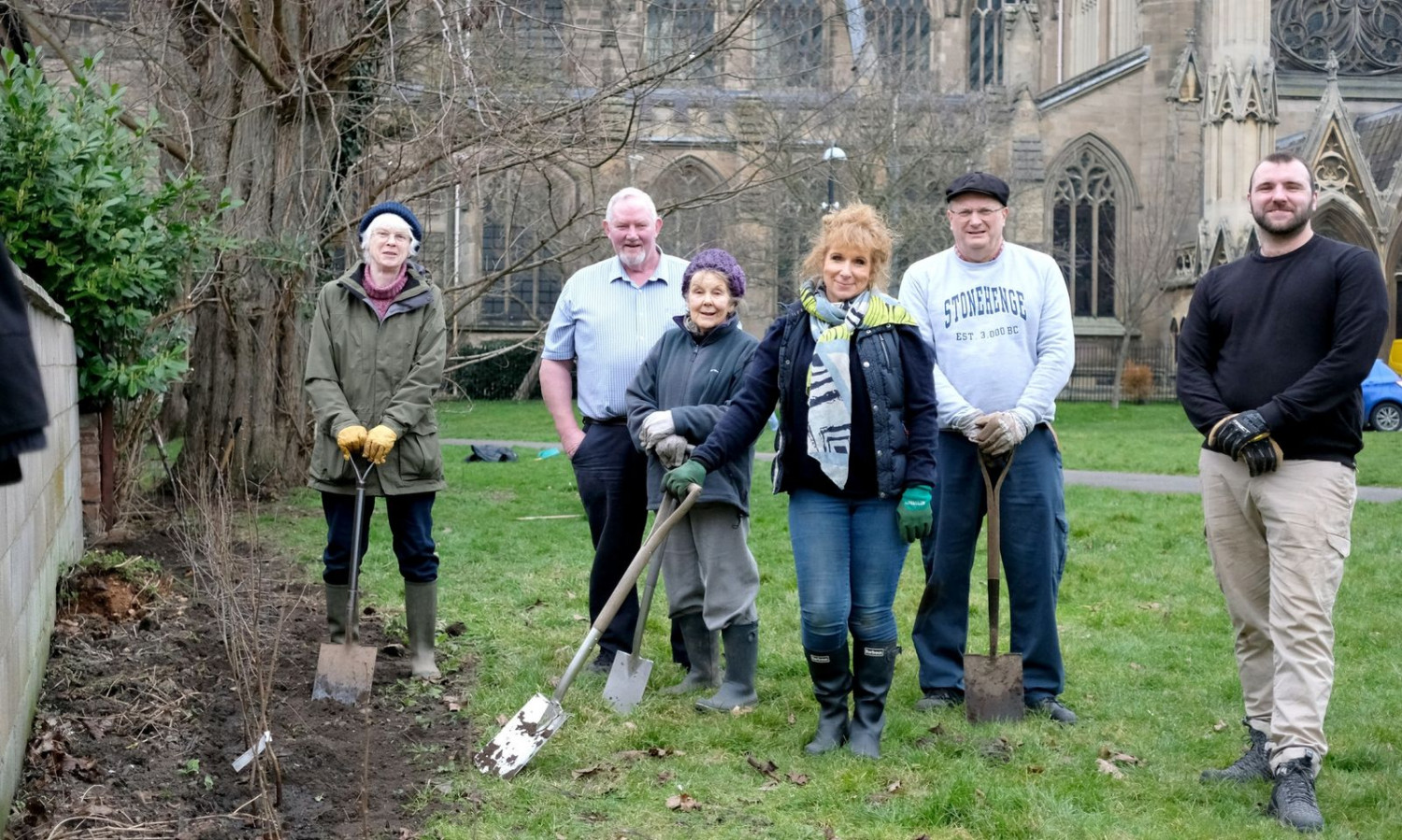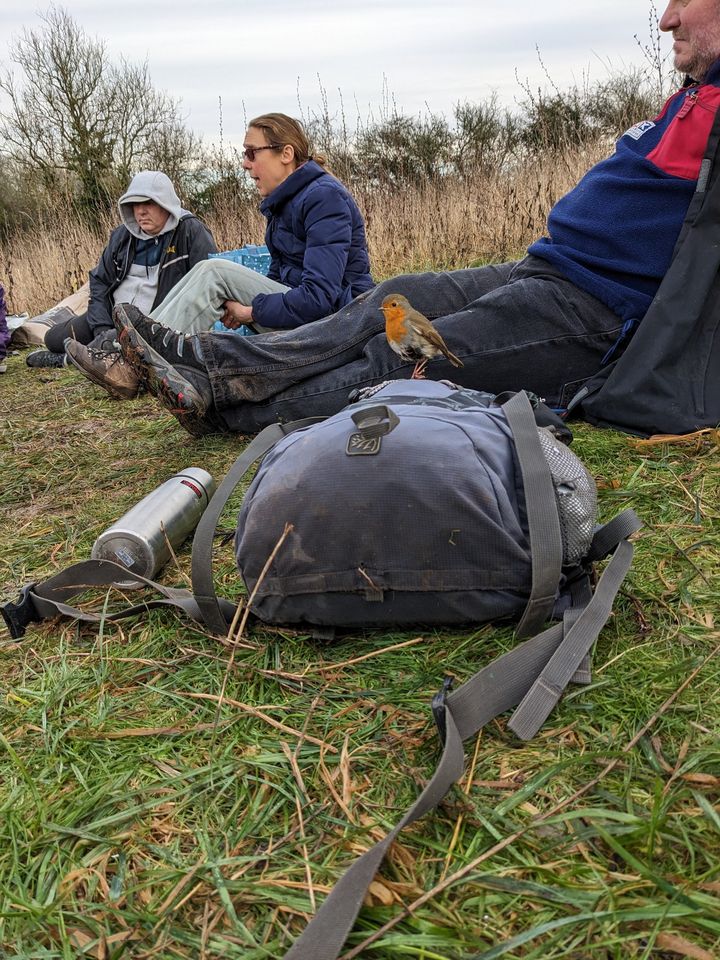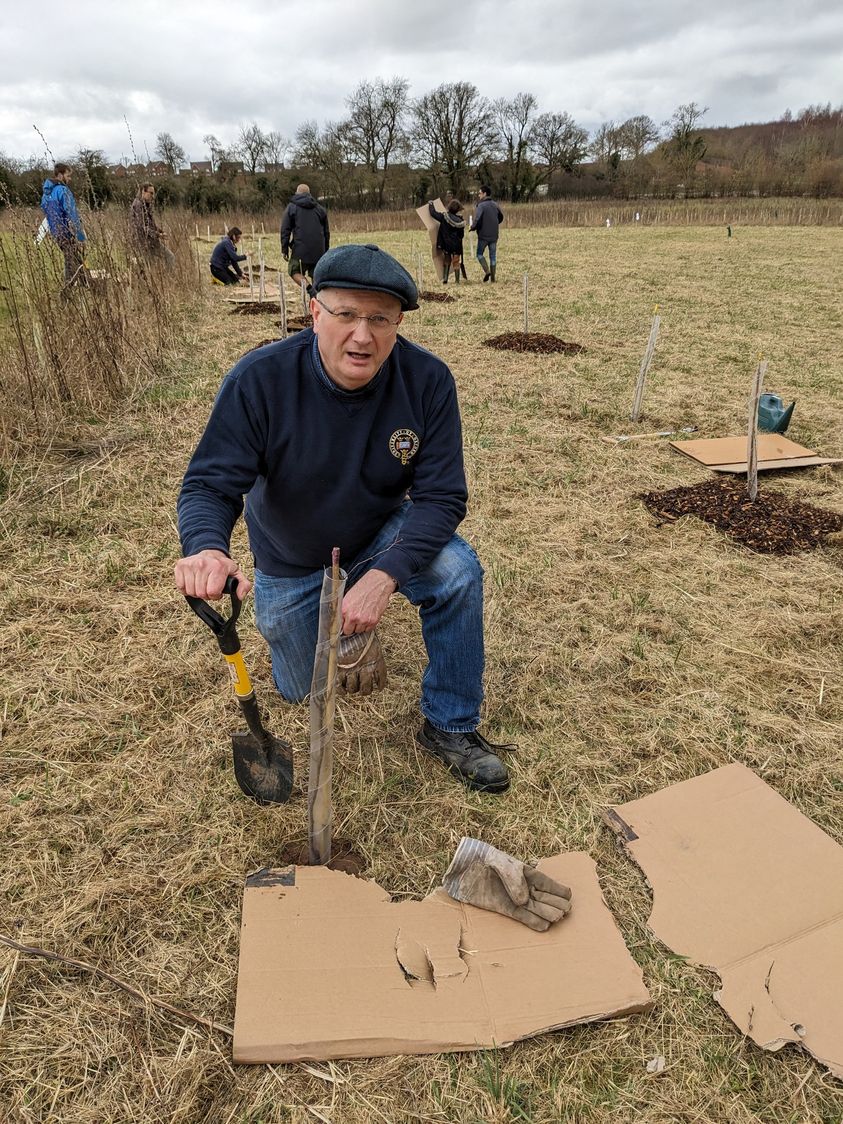
Planting at All Saints in Leamington
Gary Stocker lives in Radford Semele and attends All Saints Church in Leamington. He and his family have been environmentally aware for as far back as he can remember, although it has only been in more recent years that he has been able to put this into practise more. In this article, Gary writes about what he does to support the environment.
Wildlife and biodiversity
I am involved with various conservation groups, including Foundry Wood in Leamington Spa once a month. This is a nature reserve on part of the site of Ford’s Foundry in Leamington. I am also involved with the Children’s Forest at Leasowe Farm in Radford Semele.
The Children’s Forest has involved planting and maintaining a four-acre site of woodland with native, British trees which, when fully grown, will absorb lots of carbon dioxide, produce a lot of oxygen and capture lots of pollution particulates each year. Both sites encourage people to volunteer, which helps to generally increase awareness of sustainability. With the Children’s Forest (it is called that because it will hopefully benefit future generations) we have been planting several hundred trees, the most recent earlier this year. Thankfully we have had a lot of volunteers. Both the Children’s Forest and Foundry Wood are run by ARC (Achieving Results in Communities).
There is also a re-wilding scheme going on in the church yard at All Saints’ Church in Leamington Spa. A few weeks ago I helped to prepare the ground for tree and hedge planting and last month we planted the trees for the hedge. This was arranged by the Friends of All Saints’ Church.
In Radford Semele, where I live, a group called Friends of Radford’s Green Spaces arranged to have some rewilding on the edge of the playing fields which I helped with. It was on a Friday in December. We planted a lot of shrubs around the edge of the field to form a hedge and sowed some wildflower seeds, which will hopefully bloom this year.
At home, we have a front and back garden. On both the front and back lawns we have set aside a rectangle of ground which we let grow, with no further mowing, after the initial mowing in the spring. We also scattered some wild flower seeds in there as well. Last year it attracted lots of insects and birds which were feeding off them. I have planted lots of native flowering plants, including cowslips, English bluebells and corn flowers.
In one of the large flower beds at the back, after digging over later in the Spring (as we have done in the last two seasons), I will sow a lot of wild flower seeds and it will be left until next Spring. Last year this attracted lots of insects and therefore birds. We also make use of a water butt, filled with rain water, for watering the garden and washing cars. This obviously saves having to use tap water, which uses energy to be purified and delivered. When washing the car it leaves a better finish!

A robin joins the meeting at the Children's Forest
Plastic free and reducing waste
With domestic arrangements we make use of non-packaging shops. There is one in Leamington called Core which I use a lot. We have containers of liquid hand soap, washing up liquid, fabric conditioner, porridge oats, sugar, loose leaf tea, rice and other things we can refill rather than buying pre-packaged goods in disposable containers - the amount of plastic saved soon adds up! For a long time, even before it became law, I used reusable shopping bags.
Sustainable food
With food I have recently starting using more vegan meats, rather than real meat. Vegan meat uses a lot less energy to produce than real meat. It does actually taste just as good as the real thing, even people I have cooked it for admit that. As I say to people - give it a try. If you do not like it, then just go back to the real thing. If I cannot get a vegan alternative, then I try and obtain British meat (the more local the better) from a local butcher.
With dairy products we have started ordering from the milkman again. He is delivering to the village anyway and the containers which he delivers the milk in are reusable. With milk for a long time I have been using non-dairy milk, of which there are a lot of varieties, including hemp, pea, soya, oat and walnut.
With vegan foods do be careful though - some of them are sourced from overseas, so any energy savings with not using animal products are going to be compromised by using more energy to transport it further.
For a long time I have tried to source food locally. This obviously reduces pollution caused by transporting it. In Wellesbourne market they sell potatoes from a local farm. Over at Warwick market they sell locally produced rape seed products, including cooking oil. I drink gin and there are lots of locally produced gins. I have also started using loose leaf tea more as it uses less packaging. For a single cup I use a metal diffuser, which is reusable indefinitely. If used in a pot though, do not forget the tea strainer!
With spending on groceries in general, I will try and purchase any sustainable/ethical products rather than other ones. Instant coffee is a good example. For a long time I have also tried to buy UK made products, or failing that (when we used to be a member) EU made products. Whilst this was initially to help protect UK jobs, it also makes sense sustainably.
UK/EU goods do not have to be transported so far and also UK/EU manufacturers also tend to have stricter sustainability laws governing what they do. With there being more tax revenue available to the UK government, with increased UK economic activity, there is also more money available for the sustainability projects that the government wish to finance.
Saving energy at home
With washing clothes, rather than using the tumble dryer (which we have not used for ages) we use the washing line, letting things finally dry on the clothes horse inside. If things need ironing, they are left out overnight afterwards to finally dry. Things which do not need ironing are left on the radiator overnight. Washing clothes inside out is said to extend the life of them. They certainly do not fade as much, so it is less tempting to buy new ones because your existing ones have lost their good looks!
Recycling
We love trying out new methods of recycling every time that a new initiative has come along. The latest recycling initiative we do is to collect soft plastic for recycling. Both the Co-op, Tesco and Sainsbury’s collect soft plastic for recycling.
Obviously it is best to try and reduce your use of plastic, but what you do use you can collect for recycling. Family members from down the road also collect their soft plastic which they pass onto me. Other things collected for recycling include tooth paste tubes and brushes (Mellors the Chemist in Warwick collect them for recycling), stationery (Ryman’s the stationers collect them) and empty blister packs (the dispensary in Superdrug in Leamington collect them).
I work at the Warwick Manufacturing Group at the University of Warwick, who are very sustainably minded. I am one of the Green Champions, who work together to help make the campus greener. One task I do is extend the current recycling scheme already in place by collecting things such as old stationery, tooth paste tubes (which I mentioned earlier), etc,. I have collection points in various buildings around the campus and a colleague and I visit the collection points once a week before work. I then sort what is collected and drop it off at the afore mentioned places when I am in the area. In the kitchen areas in the building where I work, I have collection points for used teabags/tea leaves/coffee grounds and disposable wooden stirrers. I collect these most days and take them home. The teabags/tea leaves/coffee grounds go into the food caddy which the council collects and the wooden stirrers go into the green compost bin.

Planting at the Children's Forest
Transport
With transport, when I do use the car, I drive it carefully, so as to reduce fuel consumption. I also do not have a bigger engine than what I need. Combining several journeys into one reduces fuel consumption.
I work at WMG at Warwick University. I would catch the bus in more often, but although the buses in between Leamington and the university are good, the buses in between Radford Semele and Leamington are not so frequent. The one day it does work out to be practical is on Fridays, when we finish work earlier. So I do use it then, which is better than not using it at all.
Further Actions
This April I am participating in the Big Green Hike and will be raising money for Rewilding Britain.
I have been involved with various local government consultation groups to do with the environment. Late last year I participated with the mini COP 27 event at Leamington Spa town hall. I have also agreed to engage in further dialogue with the climate emergency group at Warwickshire County Council.
On Saturday 18th March I took part in RAWKUS at Warwick University. This has been going on for several years. When the students move out of on campus accommodation, some of us volunteers go into the kitchen areas and clear them of any food which has been left behind. Unopened, in date packets of food/non alcoholic drink are sorted and sent to various foodbanks/charities. So not only does this benefit local charities, but food which would have gone to waste has been saved for consumption. We have saved several tons over the years. Although it is principally staff and students who participate, people from outside are welcome to help as well, as some do.
We hope this article has inspired and influenced you in ways you can support the environment as an individual.